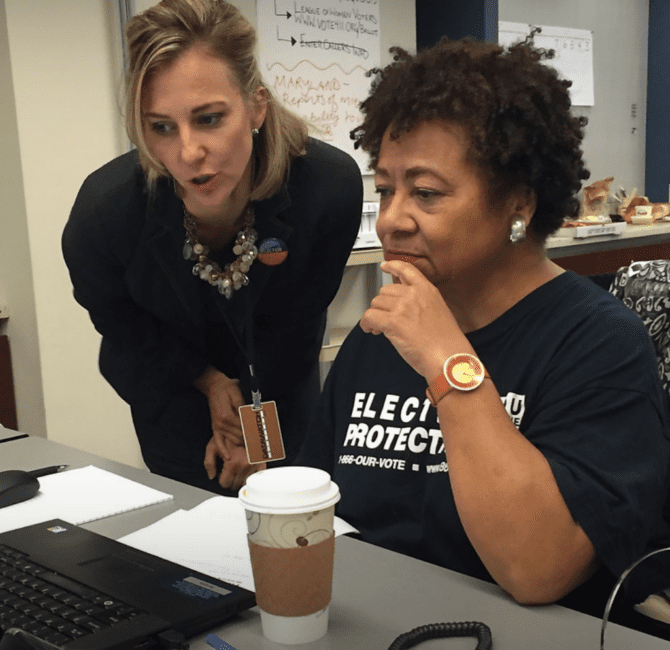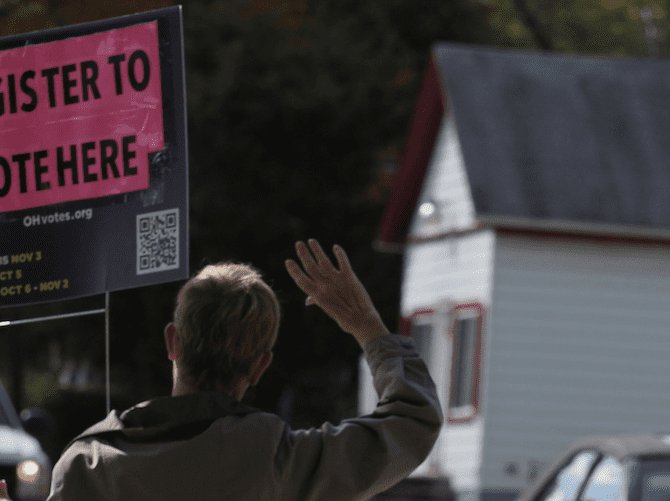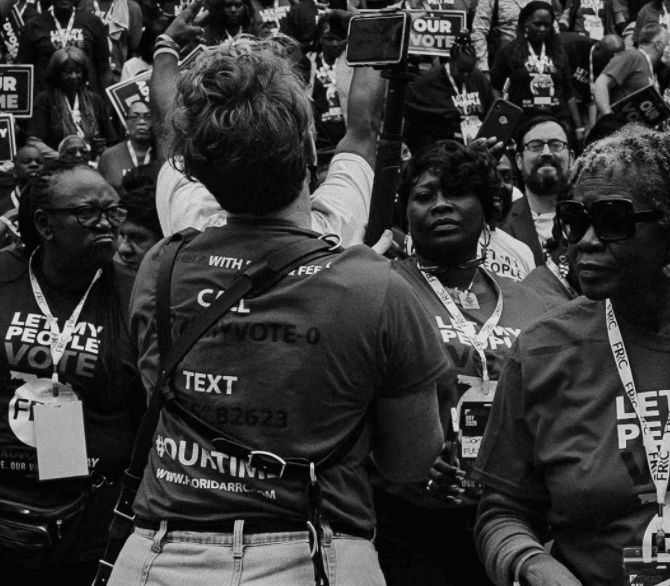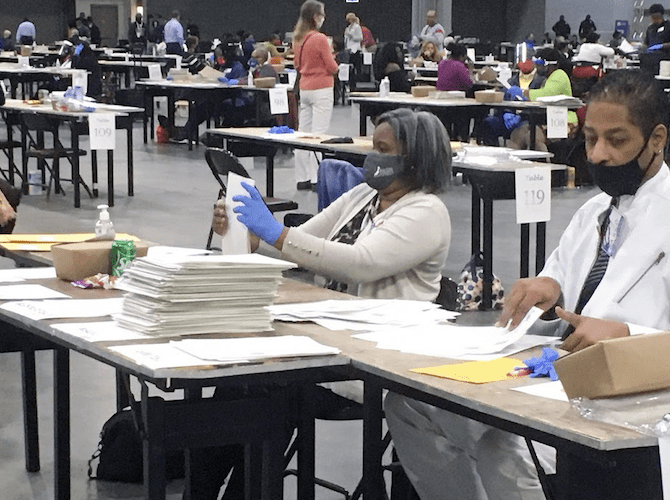Is Virginia Prepared to Debunk ‘Voter Fraud’ Lies in the Governor’s Race?
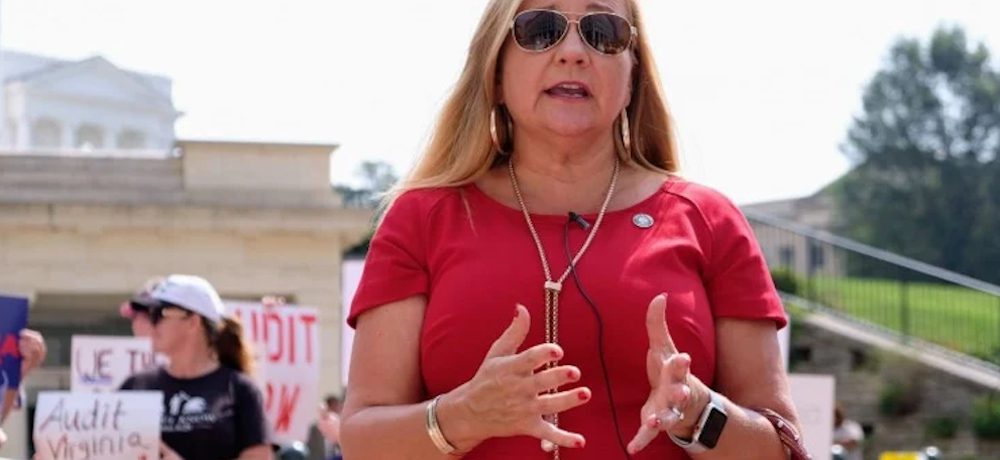
(Photo credit: twitter.com/AmandaChaseVA)
As the Virginia governor’s race heads toward a nail-biting conclusion – with polls from Fox News saying that Republican Glenn Youngkin is ahead and the Washington Post saying that Democrat Terry McAuliffe is ahead – how prepared are election experts to quickly counter disinformation should McAuliffe, a former governor, pull ahead in the first unofficial results?
The answer is not very, according to interviews with election officials, Democratic Party lawyers, election protection attorneys, and experts in academia and policy circles.
At best, it appears that government officials and experts with election administration experience will say again what Americans heard after the 2020 presidential election: that the voting process is trustworthy, includes checks and balances, and therefore the results are legitimate. What is not likely to be seen is quick and easily understood proof of the winner based in public election records that attest to legitimacy of the voters and the accuracy of the vote counts.
“I just don’t think there’s a factual way to combat this, or debunk this, nor do I think that’s an effective strategy,” said David Becker, executive director and founder of the non-partisan Center for Election Innovation and Research. “The simple fact is that if McAuliffe wins, the election deniers will claim fraud, regardless of facts, and then will make things up to support their false claims. We need a broader narrative about the security of elections, and force them to answer to that.”
Becker continued, “The fact is that since 2017, Virginia has paper ballots statewide, and in the last couple of years, has instituted risk-limiting audits throughout the state. Ballots cannot be made up or dumped. I am firmly against getting into a meaningless cycle where we have to prove that an election had integrity when we’ve already done so. We’ve seen how that won’t change minds.”
Becker is referring to post-election claims, most notably in Arizona, Georgia, Pennsylvania, and Wisconsin. In those states, pro-Trump legislators have launched “bad-faith audits” where they have hired Trump partisans with little election auditing experience, and given them great leeway look for problems that could be used to cast doubt on results where Trump lost.
During a press briefing on Monday by the Lawyers’ Committee for Civil Rights Under Law, which hosts a hotline to assist anyone having trouble accessing a ballot, Alexandria Bratton, senior program manager with the Virginia Civic Engagement Table, also pointed to the post-election audits—which would come after the results are certified just before Thanksgiving.
“Our elections, time and time again, have shown that we don’t have any large-scale anything [wrong] that’s really going on,” Bratton said. “I think it’s just a matter of using our facts, instead of some of the narratives that folks are trying to push to place fear into our voters.”
Bratton’s comments were similar to those from other election experts, including recently issued reports that said voting system-testing protocols and audits sufficed to counter disinformation. When Voting Booth noted that disinformation started on Election Day or sooner, while audits occurred weeks later — leaving a void that can be filled with conspiracy chatter — Bratton noted that false claims about Virginia’s governor’s race have already appeared, but reiterated that the job of election protection advocates is to help voters cast ballots and then arm them with facts.”We’ve actually already started seeing some of that disinformation floating on social media… [and at] some of their rallies,” Bratton said. “It’s not even waiting for results to come in. Folks are already pushing those types of narratives to get those thoughts into folks’ minds ahead of time. So what we have tried to do, as the nonpartisan election protection coalition, is just remind folks what the facts are, and when to actually see the results.”
The partisan organizations most heavily invested in the governor’s race are the political parties. Frank Leone, an election lawyer working with the Democratic Party of Virginia said the party has been “monitoring all that stuff pretty closely, which include Republican and MAGA [Trump’s Make America Great Again] group efforts… basically watching everything they do with their theory that somehow in the middle of the night they are switching votes.”
Leone said that MAGA factions have begun to copy Arizona activists by knocking on some voters’ doors to ask them if they really requested a mailed-out ballot — a tactic that, as the Department of Justice warned Arizona’s Trumpers, may violate federal voter intimidation laws. The state’s Democratic Party is also monitoring GOP efforts to reportedly deploy several thousand poll watchers as a “line of defense against election fraud,” as the Washington Post reported. Top Virginia GOP officials also have been saying that the state’s use of drop boxes to receive the mailed-out ballots was an invitation for voting more than once — which is not true, as every return envelope goes through several checks to verify the voter before being opened.
Leone said the state party “was trying to be in the position to respond to these things,” and was also concerned about what’s been called the “Blue Shift.” That’s shorthand for the tendency of lower population, rural, GOP-heavy counties to report first on Election Night — presumably putting Youngkin ahead — followed by the state’s urban centers, led by suburbs of Washington, D.C., which report their results later in the evening — presumably tilting the count toward McAuliffe. But for the most part, the party has “stayed out of the papers and haven’t put our side in.”The Virginia Department of Elections has put up web pages seeking to debunk false claims about elections. Most of its messaging has been consistent with efforts by election officials in other states, emphasizing that there are many safeguards along the path of verifying voters and counting ballots—but not getting into much detail about those protocols and underlying data.
This overall status quo is not encouraging to Ion Sancho, who recently retired after three decades as an election official in Florida and was a technical advisor to the Florida Supreme Court during the Bush v. Gore litigation (where the U.S. Supreme Court stopped a state-based recount and appointed Bush president in 2000.)
“They are fighting the last war, the only war they have experienced, not the one we’re in now,” Sancho said, referring to election officials’ responses to attacks on voting by Trump’s base. “It’s like the Defense Department always fights the last war, instead of anticipating the new one.”



